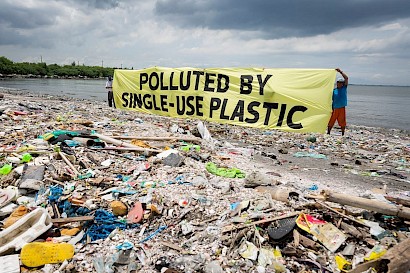Big brands including Coca Cola call for ‘global pact to combat plastic pollution’
 Big brands including Coca Cola and Pepsico have called for a global pact to battle plastic pollution.
Big brands including Coca Cola and Pepsico have called for a global pact to battle plastic pollution.
The proposed pact would include cuts in plastic production, saying that a circular economy for plastics will ‘contribute to the efforts to tackle climate change and biodiversity loss, while bringing positive social and economic impacts’.
There are more than 70 signatories to the statement, including Walmart, Unilever and Nestle.
Later this year, world officials will meet at a United Nations Environment Assembly conference (UNEA 5.2) for negotiations on a treaty to tackle a plastic waste crisis that is choking landfills, despoiling oceans and killing wildlife.
The joint statement said: ‘“We are at a critical point in time to establish an ambitious UN treaty.
“UNEA 5.2 is the decisive, most auspicious moment to turn the tide on the global plastic pollution crisis. We cannot afford to miss it.”
It remains unclear whether any deal will focus on waste management and recycling or take tougher steps such as curbing new plastic production, a move that would likely face resistance from big oil and chemical firms and major plastic-producing countries like the US.
Less than 10% of all the plastic ever made has been recycled.
A Reuters investigation last year revealed that new recycling technologies touted by the plastics industry have struggled to combat the problem.
Meanwhile, production of plastic, which is derived from oil and gas, is projected to double within 20 years.
This is a key source of future revenue for energy companies, as demand for fossil fuels wanes with the rise of renewable energy and electric vehicles.
While scaling-up global recycling is critical to tackling plastic waste, these efforts will not prevent plastic pollution from continuing to skyrocket without constraints on production, a landmark 2020 study by Pew Charitable Trusts found.
Last year, a new study showed that plastic has a far worse carbon footprint than previously believed.
The problem is that plastic is often made in coal-based newly industrialised countries such as China, India, Indonesia and South Africa.
The energy and process heat for the production of plastics in these countries comes primarily from the combustion of coal.
The researchers say that the global carbon footprint of plastics has doubled since 1995, reaching 2 billion tonnes of CO2 equivalent (CO2e) in 2015.
This represents more than 4.5% of global greenhouse gas emissions, and is more than previously thought.
Over the same period, the global health footprint of plastics from fine particulate air pollution has increased by 70%, causing approximately 2.2 million disability-adjusted life years
The researchers looked at the greenhouse gas emissions generated across the life cycle of plastics - from fossil resource extraction, to processing into product classes and use, through to end of life, including recycling, incineration and landfill.
The production phase of plastics is responsible for the vast majority – 96% – of the carbon footprint of plastics.
Livia Cabernard, a doctoral student at the Institute of Science, Technology and Policy (ISTP) at ETH Zurich, said: “So far, the simplistic assumption has been that the production of plastic requires roughly the same amount of fossil fuel as is contained in the raw materials in plastic — above all petroleum.”
“The plastics-related carbon footprint of China’s transport sector, Indonesia’s electronics industry and India’s construction industry has increased more than 50-fold since 1995.”
“Even in a worst-case scenario in which all plastics are incinerated, their production accounts for the lion’s share of total greenhouse gas and particulate matter emissions.”
You can return to the main Market News page, or press the Back button on your browser.

